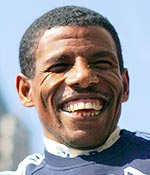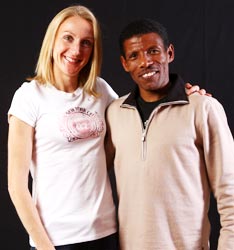|
|
| Help | |
| You are here: Rediff Home » India » Sports » Reuters » Report |
|
 Haile Gebrselassie | ||
| |||||||||||||||||||||||
|
| |||||||||||||||||||||||
World record holder Haile Gebrselassie will aim for an Olympic marathon title at the 2012 London [Images] Games after deciding the pollution in Beijing [Images] this year represents an unacceptable health threat.
The twice Olympic 10,000 metres champion, who will be 39 in 2012, suffers from exercise-induced asthma and will not compete in Beijing unless he qualifies for the Ethiopian 10,000 team.
"The pollution in China is a threat to my health and it would be difficult for me to run 42 kilometres in my current condition," he said.
Gebrselassie's decision highlights the pollution problem in Beijing after International Olympic Committee president Jacques Rogge said last year that the marathons or the cycling distance events could be rescheduled if conditions are too bad.
"We have made great efforts to battle pollution over the last 10 years and have made great progress in that, with air quality improving in each of the last nine years," said Sun Weide, spokesman of the Beijing Organising Committee for the Olympic Games (BOCOG).
"In addition, we have drawn up a contingency plan to ensure air quality at the Olympics [Images] which involves Beijing and the surrounding five provinces joining hands.
"We are very confident, therefore, that we will deliver good air quality at Games time."
ASTHMA ATTACKS
Dr Michal Krzyzanowski of the World Health Organisation has told the BBC that the city's poor air quality could trigger asthma attacks.
 Gebrselassie's manager Jos Hermens said the runner would attempt to qualify for the Beijing 10,000 in the Dutch town of Hengelo on May 24.
Gebrselassie's manager Jos Hermens said the runner would attempt to qualify for the Beijing 10,000 in the Dutch town of Hengelo on May 24.
"His ideal picture was... for the next four years to try to break his own [marathon] world record and try to win in London 2012 because Beijing is very risky," said Hermens. "I'm not a scientist but how can you train for pollution?"
Last year Britain's women's world record holder Paula Radcliffe, who also suffers from exercise-induced asthma, asked pollution experts to help her prepare for the Games.
CHANGE MEDICATION
Her husband and manager Gary Lough told the BBC that Radcliffe might have to change her medication in China.
"She may have to adapt her doses or medication but, as long as we've done enough research and thought about it, it hopefully won't be an issue," he said.
"There's no point in us being especially concerned, because pollution's not really something you can control."
Belgian Justine Henin [Images] told reporters last year she might not defend her tennis gold medal in Beijing after pulling out of the China Open in September because of asthma.
Hermens also pointed out that Olympic marathons are usually run in far from ideal conditions at the height of summer.
The 1900 Paris, 1904 St Louis and 1912 Stockholm marathons were run in sweltering heat and even the 1908 London event took place in temperatures of 25 degrees Celsius.
More recently, 39-year-old Swiss Gabriele Andersen-Scheiss collapsed over the line in the 1984 Los Angeles women's marathon after weaving around the track before horrified spectators.
At the high-altitude 1968 Mexico City Olympics, world record holder Ron Clarke of Australia was unconscious for 10 minutes after finishing sixth in the 10,000 final. Clarke later suffered from heart problems.
| © Copyright 2008 Reuters Limited. All rights reserved. Republication or redistribution of Reuters content, including by framing or similar means, is expressly prohibited without the prior written consent of Reuters. Reuters shall not be liable for any errors or delays in the content, or for any actions taken in reliance thereon. |
|
|
| © 2008 Rediff.com India Limited. All Rights Reserved. Disclaimer | Feedback |